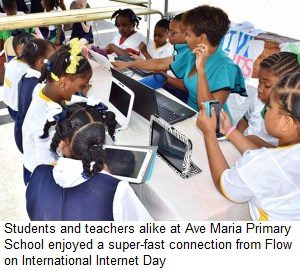Go Lean Commentary
11Again, if two lie down together, they will keep warm; but how can one keep warm alone? 12And though one may be overpowered, two can resist. Moreover, a cord of three strands is not quickly broken. – The Bible Ecclesiastes 4:11 – 12 Berean Study Bible
It is so unfortunate that these Caribbean islands think that they are … “islands”. Didn’t they ever hear:
‘No man is an island’? – English metaphysical poet John Donne (1572-1631)
The phrase ‘no man is an island‘ expresses the idea that human beings do badly when isolated from others and need to be part of a community in order to thrive. Donne was a Christian but this concept is shared by other religions, principally Buddhism.
 These islands do acknowledge that there are other islands, but rather than cooperating and collaborating together, the strategy seems to be limited to just competition – “It’s Better in … “
These islands do acknowledge that there are other islands, but rather than cooperating and collaborating together, the strategy seems to be limited to just competition – “It’s Better in … “
This is the continued focus of this series of commentaries on Caribbean [dis]unity. This submission is 2 of 4 from the movement behind the book Go Lean … Caribbean – is in consideration of the societal defects in the region that prevents us from banding together. We do not reform nor transform like other communities; we do not confederate nor consolidate; we somehow think that we are better than our neighbors and can survive alone. What a joke!
The other commentaries in the series are cataloged as follows:
- Caribbean Unity? – What a joke – Tourism Missteps
- Caribbean Unity? – Ross University Saga
- Caribbean Unity? – No Freedom of Movement in/out of French Antilles
- Caribbean Unity? – Religion’s Role: False Friend
All of these commentaries relate to “how” the stewards for a new Caribbean can shepherd unity in this region. But first we must accept that Caribbean Unity is a joke, despite a previous formal exercise in regional integration called CariCom. In truth, CariCom is not the first integration attempt:
- In the English-speaking islands, there was the disastrous West Indies Federation.
- In the Dutch-speaking islands, there was the now-defunct Netherlands Antilles.
This talk of Caribbean Unity/Disunity is not just academic; this has real world implications. Just last year, the Eastern Caribbean island of Dominica was devastated by Category 5 Hurricane Maria; the operations of their biggest non-tourism economic engine – Ross University and their 3500 students – was greatly impacted. The end result, another island, Barbados seems to have recruited Ross University to “relocate shop” to their island … permanently – not just during the recovery. This charge reflects the disunity of the region. Dominica and Barbados should have been collaborating, not competing.
This is not just our movement’s complaint alone; many community leaders identify and observe this bad trend. Consider here, this news article relating the story:
Title: Ross University saga an indictment on CARICOM
The leader of the Lucian Peoples Movement, Therold Prudent, has declared that the Ross University saga involving Dominica and Barbados, is an indictment on the Caribbean Community (CARICOM), the regional grouping to which both countries belong.
The institution is relocating from Dominica to Barbados.
“It just proves that we are like crabs in a barrel,” Prudent told St Lucia Times in an interview Friday.
“We are continually fighting each other for a little bread, for opportunity, whereas we should be standing with each other and at least saying to this University ‘Listen, this is a sister Island. You can’t just pick up and go and just come into another Caribbean Island because you believe that the terms aren’t favourable to you anymore in that particular country.’”
The LPM leader asserted that countries within CARICOM need to speak with one voice.
He expressed the view that the Ross University issue demonstrates that foreigners and investors understand the disunity and weakness in CARICOM and Caribbean Islands.
According to Prudent, the investors understand that all they have to do is “put a carrot before us and we will jump for it, not mindful if it is going to cost the other nation or country which is a part of CARICOM. ”
He said CARICOM has not lived up to expectations, including speaking with one voice on the international stage and adopting a unified foreign policy.
“Right now we are in a situation where everybody is looking after themselves and it is not about the region as a whole” the LPM leader lamented.
He told St Lucia Times that under such circumstances, it is easy for investors to disrespect the Caribbean.
On Tuesday, Barbados Prime Minister, Mia Mottley was quoted as denying that there was anything underhanded by her administration, in accepting the Ross University School of Medicine’s move to the island from Dominica.
Mottley asserted that the hands of her administration are clean, local media reports said.
Last Friday, Dominica’s Prime Minister Roosevelt Skerrit announced that Ross University, which had been forced to relocate its operations to St Kitts and the state of Tennessee in the United States following the passage of Hurricane Maria last September, would be leaving the Eastern Caribbean nation after 40 years.
Source: Posted August 10, 2018; retrieved August 23, 2018 from: https://stluciatimes.com/2018/08/10/prudent-ross-university-saga-an-indictment-on-caricom/
As related in the foregoing, these words by a St Lucian Opposition Party Leader is quite an indictment:
“… foreigners and investors understand the disunity and weakness in CARICOM and Caribbean Islands”
Our disunity is a joke … to the rest of the world!
No doubt, there should be regional integration. In fact what is needed is a Single Market. The spirit of CariCom – attempting integration – is a good one; but the execution is failing. The book Go Lean…Caribbean – available to download for free – opened with an honest assessment of CariCom; it stated (Page 14):
In July 2013, the Caribbean Community (CariCom) celebrated its 40th anniversary of ascension to pomp and gallantry… and much criticism. Many political and social commentators expressed how the CariCom had disappointed so many in their delivery of any reasonable success for economic integration. One commentator, Caribbean icon Sir Shridath Ramphal, (who served as the second British Commonwealth Secretary-General from 1975-1990; Foreign Minister of Guyana from 1972 – 1975; and previous stints as Chancellor at the University of the West Indies – until 2003 – and of the University of Guyana), charged that the leadership in the Caribbean region has “put the gears of the CariCom Single Market in neutral and the gears of its Single Economy into reverse”.
The movement behind the book Go Lean … Caribbean seeks to reboot and relaunch the integration effort. But this time, with all Caribbean member-states (30), not just the English-speaking, but partnering with the French Antilles and Spanish-speaking states as well. The Go Lean book serves as a roadmap for the introduction and implementation of the Caribbean Union Trade Federation (CU), an elevated entity that graduates from CariCom. The CU is design to reach greater heights than CariCom ever contemplated; see Appendix CU > CC below.
There are a lot of issues that affect the economic landscape that are too big for any one member-state to contend with alone. Category 5 hurricanes are one of them. The facilitation to restore and recover should be a regional effort and not just a national issue. Obviously, Dominica failed in its delivery for Ross University; see the encyclopedic details on that school history and recovery here (and the Appendix VIDEO on Ross 40th Year Timeline below):
Title: Ross University School of Medicine
History
The medical school was founded in 1978 as The University of Dominica School of Medicine by Robert Ross, an entrepreneur.[2][3] At the time, it was housed in leased facilities at The Castaways Hotel, with an inaugural class of 11 students. In 1982, the University of Dominica School of Medicine formally changed its name to Ross University School of Medicine at the request of the government of Dominica.
In 1985 California state medical licensing officials (the Board of Medical Quality Assurance), began investigating RUSM, along with other medical schools located in the Caribbean.[4] The officials released a report stating that RUSM at that time had nearly no admissions standards, and that the school was in the business of providing medical degrees to “everyone that wants one.”[4] RUSM agreed to implement a number of changes recommended by the board and has since graduated over 11,000 practicing physicians.[4]
In the late 1990s, RUSM expressed interest in opening a new medical school in Casper, in the U.S. state of Wyoming, but accreditation was denied by the Liaison Committee on Medical Education, the organization that accredits MD-granting medical schools in the United States.[5] Some local individuals welcomed the economic impact of a new medical school on the town, but critics questioned the quality of education at a for-profit institution.[5] In 2003, RUSM was acquired by DeVry Education Group,[6] which has since renamed itself Adtalem Global Education.
The school was impacted by Hurricane Maria in 2017, when the Category 5 storm made landfall on the island of Dominica. The hurricane knocked out communications, effectively isolating RUSM from the outside world. The campus suffered moderate damage from the effects of Maria. Students and faculty were located through a university-initiated roll call, and then were evacuated from the campus to the U.S. mainland.[7]
In October 2017, the university announced that classes for the fall semester would resume mid-October aboard the GNV Excellent, an Italian ferry that would be docked off the coast of the island of St. Kitts. The ship was reconfigured as an educational venue. [7]
In November 2017, Ross University School of Medicine announced plans to relocate temporarily to Knoxville, Tennessee for continuation of medical school classes. Lincoln Memorial University (LMU), based in Harrogate, Tennessee and with operations in Knoxville, will provide the necessary operational capacity and the technical capabilities to support RUSM faculty, students, and staff. [8]
Ross University School of Medicine has announced that the main campus will be relocated from Dominica to Barbados for the beginning of the 2019 Spring semester. [9] [10]
Source: Retrieved August 23, 2018 from:
https://en.wikipedia.org/wiki/Ross_University_School_of_Medicine#History
Poor Ross University and poor Dominica.
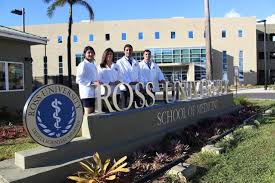
The governance in this Caribbean region is so poor that these institutions could not anticipate the worst-case scenario of a hurricane. Sad! 🙁
The Caribbean as a region and the nation-state of Dominica has an inadequate status quo for providing the needs of the people and trading partners in these homelands. We are also inadequate for dealing with the challenges of nation-building. As a regional construct, we must do better! We must convene, consolidate, collude, confederate and collaborate, not compete.
The CU is designed to be a technocratic intergovernmental entity that shepherds economic growth for the full Caribbean region and mitigate against related security challenges – including preparation and response for natural disasters. The goal is to use a regional focus to reboot and optimize the region’s societal engines. The Go Lean/CU roadmap will employ strategies, tactics and implementations to impact its prime directives; identified with the following 3 statements:
- Optimize the economic engines in order to grow the regional economy to $800 Billion & create 2.2 million new jobs.
- Establish a security apparatus to ensure public safety and protect the resultant economic engines.
- Improve Caribbean governance to support these engines.
The Go Lean book stresses that the required reform to transform Caribbean disaster preparation may be too big for any one country (think: Dominica); the solution must be a regional delivery (think: CariCom). This was an early motivation for the roadmap, as pronounced in the opening Declaration of Interdependence (Pages 12 – 13):
i. Whereas the earth’s climate has undeniably changed resulting in more severe tropical weather storms, it is necessary to prepare to insure the safety and security of life, property and systems of commerce in our geographical region. As nature recognizes no borders in the target of its destruction, we also must set aside border considerations in the preparation and response to these weather challenges.
xi. Whereas all men are entitled to the benefits of good governance in a free society, “new guards” must be enacted to dissuade the emergence of incompetence, corruption, nepotism and cronyism at the peril of the people’s best interest. The Federation must guarantee the executions of a social contract between government and the governed.
xvi. Whereas security of our homeland is inextricably linked to prosperity of the homeland, the economic and security interest of the region needs to be aligned under the same governance. Since economic crimes … can imperil the functioning of the wheels of commerce for all the citizenry, the accedence of this Federation must equip the security apparatus with the tools and techniques for predictive and proactive interdictions.
xxiv. Whereas a free market economy can be induced and spurred for continuous progress, the Federation must install the controls to better manage aspects of the economy: jobs, inflation, savings rate, investments and other economic principles. Thereby attracting direct foreign investment because of the stability and vibrancy of our economy.
The Go Lean book provides 370-pages of turn-by-turn instructions on “how” to adopt new community ethos, plus the strategies, tactics, implementations and advocacies to execute so as to reboot, reform and transform the societal engines of Caribbean society, for better preparation for natural disasters. Consider this specific implementation the book, where the functionality of the Emergency Management Agency is described; this is a subset of the Cabinet-level Homeland Security Department. This is described in the book as follows on Page 76 with the section title:
B – Homeland Security Department
| B4 – Emergency Management
This area is perhaps one of the most important functions of the CU. The Emergency Management Department will coordinate the planning, response, rebuilding and recovery before, during and after natural disasters and other emergency events. This is the risk management arm of the CU Trade Federation. As such, the scope of Emergency Management will also include education, mentoring, monitoring, mitigation, licensing and coordination of all volunteer activities. While the # 1 economic driver in the region is tourism, any poorly managed episode of “man-made” emergencies will have devastating effects on tourist bookings. Therefore, the CU must respond quickly, forcefully and professionally to contain the physical and image damage that can occur from these incidents. Though not exclusive, this agency will coordinate its specialized services, skill-sets and occupations like Paramedic, EMT, Search-and-Rescue, Canine (K-9) with other governing (law enforcement) entities. Regional training will therefore be coordinated, licensed, and certified by this CU Emergency Management Department. This Emergency Management agency will also coordinate the training and management of animal responders, in conjunction with the other federal agencies of Justice, Agriculture, Interior (Parks). The animals will include bomb sniffing dogs, cadaver dogs, drug dogs and mounted police horses. There is also an economic/financial scope for this department. As the effort for a comprehensive property-casualty fund to cover the entire Caribbean region will also be coordinated by this agency. The classic solution is a large pool of premium payers and claims filed by the affected area. Beyond this model, there are also advanced products like re-issuance side-cars for market assimilation. The public can then invest and profit from the threat/realization of regional risks. This derivative product is a bet, a gamble, but in the end, the result is an insurance fund of last resort, much like the Joint Underwriters Agency (JUA) in Florida. |
The Caribbean must foster a better disaster preparation and response apparatus. Systems of commerce are at stake. So the Go Lean roadmap address “this” as a Prime Directive, asserting that the region’s security and economics must be managed with the same priorities. This Go Lean movement has previously detailed many related issues and advocacies for regional disaster preparation and response; consider this sample of previous blog-commentaries:
| https://goleancaribbean.com/blog/?p=15059 | Regional Tourism & Disaster Coordination – No Longer Optional |
| https://goleancaribbean.com/blog/?p=15031 | “Profiting” from Hurricanes – Disaster Risk Funds |
| https://goleancaribbean.com/blog/?p=15012 | In Life or Death: No Love for Puerto Rico |
| https://goleancaribbean.com/blog/?p=14832 | Example of Manifesting Environmental Change |
| https://goleancaribbean.com/blog/?p=13391 | After Maria, Destruction and Defection for Puerto Rico |
| https://goleancaribbean.com/blog/?p=12996 | After Irma, Failed State Indicators: Destruction and Defection |
| https://goleancaribbean.com/blog/?p=12977 | After Irma, Barbuda Becomes a ‘Ghost Town’ |
| https://goleancaribbean.com/blog/?p=12900 | The Logistics of Disaster Relief |
| https://goleancaribbean.com/blog/?p=12879 | Disaster Preparation: ‘Rinse and Repeat’ |
| https://goleancaribbean.com/blog/?p=9455 | Fix ‘Climate Change’ – Yes, We Can |
| https://goleancaribbean.com/blog/?p=6893 | A Meteorologist’s View On Climate Change |
| https://goleancaribbean.com/blog/?p=1817 | Caribbean grapples with intense cycles of flooding & drought |
In summary, the Caribbean has a problem. So many of our people – and institutions – flee their homelands, especially in the aftermath of disastrous storms. The reasons they leave are defined as both “push” and “pull”. “Push” would refer to the resultant deficient infrastructure forcing stakeholders to abandon the community, and “pull” would refer to the perception that there are better economic opportunities elsewhere, so these ones are lured or pulled to make a living elsewhere.
Ross University was pushed from Dominica and pulled to Barbados! This is a direct product of deficient recovery!
In general, 70 percent brain drain rate has been reported among the professional classes., so our problem experienced by Ross University in this case is not unique. This lack of recovery ability emerged before Hurricane Maria and will continue long after … if the region do not implement better recovery systems and schemes.

It is time now to deploy the practical measure of a better recovery system and scheme – think Regional Risk Reinsurance Funds. This starts with the concepts of confederation and collaboration; not competition. This is our best hope for the future.
So we must reform and transform the Caribbean’s societal engines to better allow for our tropical realities. This is the quest of the Go Lean roadmap. These practical measures are conceivable, believable and achievable.
All Caribbean stakeholders – governments and citizens alike – are urged to lean-in to this roadmap for change … and empowerment. We can make our region a better place to live work, learn and play. 🙂
Download the e-Book Go Lean … Caribbean – now!
Sign the petition to lean-in for this roadmap for the Caribbean Union Trade Federation.
—————
Appendix – CU > CC (CU Greater Than CariCom)
There have been some efforts at regional integration, but only for individual language groups.
The Caribbean Union is the next evolution from the structured economic integration that became the Caribbean Community, but now for all neighbors. The globally accepted 7 degrees of economic integration, which spurned CariCom, are defined as:
- Preferential trading area
- Free trade area, Monetary union
- Customs union, Common market
- Economic union, Customs and monetary union
- Economic and monetary union
- Fiscal union
- Complete economic integration
CariCom was enacted in 1973 as Stage 3; but Stage 4 was ratified in 2001 and branded the Caribbean Single Market & Economy. This effort sputtered – see Anecdote # 1. The CU is a new manifestation of Stage 4; a graduation for CariCom.
Source: Book – Go Lean … Caribbean Page 3
—————
Appendix VIDEO – RUSM 40th Anniversary Timeline – https://youtu.be/R62eushQSdE
Ross University School of Medicine
Published on Jun 22, 2018 –
Category: Education


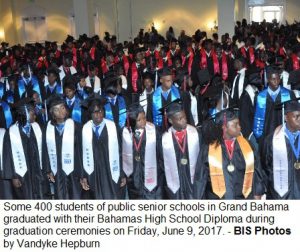

 “Be the change you want to see in the world” – Mahatma Gandhi
“Be the change you want to see in the world” – Mahatma Gandhi
 “Put your money where your mouth is” – Popular Challenge
“Put your money where your mouth is” – Popular Challenge In the United States, a 401(k) plan is the tax-qualified,
In the United States, a 401(k) plan is the tax-qualified, 

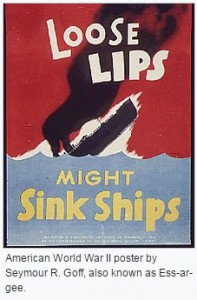 … this is an American-English idiom meaning “beware of unguarded talk”. The phrase originated on propaganda posters during World War II.
… this is an American-English idiom meaning “beware of unguarded talk”. The phrase originated on propaganda posters during World War II.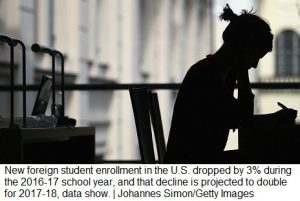 American universities are losing out to colleges in other countries in the race to enroll international students, and they’re blaming President Donald Trump.
American universities are losing out to colleges in other countries in the race to enroll international students, and they’re blaming President Donald Trump. Welcome to March. Welcome to Madness. But the focus here is on basketball, not
Welcome to March. Welcome to Madness. But the focus here is on basketball, not 

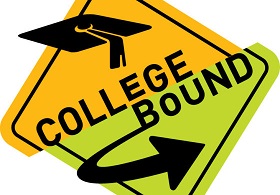 Who knew?
Who knew?
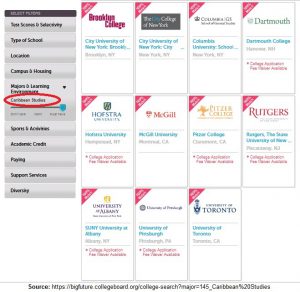
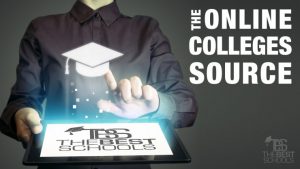
 A true fact of the past is that “we cannot change it”.
A true fact of the past is that “we cannot change it”.